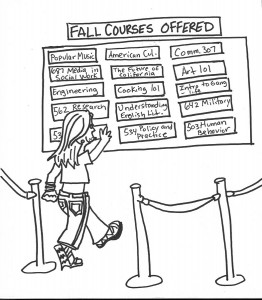Fresh, dynamic class options are needed
In high school, a misconceived picture of college is painted: a utopia that is not only free of parental supervision, but one where students can also explore their interests by taking whatever classes they want.
I transferred to USC my junior year, but at neither at NYU nor USC did I ever feel like I had academic freedom. Nor did I feel like I was presented with options that diverged from the beaten path and would teach me something worthwhile in a truly interesting way.
The search for such a class this semester highlighted a void at USC, a critical lack of classes that go beyond the norm of what is required of a university and its students. USC needs more classes that experiment with the untraditional, that push boundaries and force interaction with people and exploration of places outside the classroom.
It wasn’t until this semester — my last — that my schedule and number of credits even allowed me to look for such a class. This search, which spanned across departments from creative writing to political science, was wholly disappointing.
Many courses seemed stale and repetitive. Syllabi from past semesters looked like they were all produced from one master syllabus: reading assignments, a couple four- to six-page papers, one midterm, one final — nothing more, nothing less.
I eventually enrolled in “Sound Clash: Popular Music and American Culture” (COMM 307), based on a love of music and a recommendation that Professor Josh Kun is an exceptional professor.
After one day of class, I found out what college classes should really be like.
They should be engaging and comfortable so that students actively want to participate. They should, as much as is relevant and possible, relate to what students care about — contemporary issues, people, music and events (Kun opened class by reading the lyrics to Carly Rae Jepsen’s “Call Me Maybe,” a song I know everyone cares immensely about.)
They should put technology to use in an effective and engaging manner. They should encourage students to take their education outside the classroom (one of Kun’s assignments is a review of a live concert).
It’s also important to note that I’ve never taken a communication class before. I’m not an Annenberg student. Such porous boundaries between USC’s schools are a definite boon that all students should take advantage of during their time here.
There is also a year-old experimental class, taught by Professor Dan Schnur, director of USC’s Jesse M. Unruh Institute of Politics, called “The Future of California” (MDA 475). The class is broken into sections by various issues facing California, such as the economy, public education, the environment and criminal justice. Each section is then broken into pods of instruction, led not only by Schnur, but also by a guest USC faculty member working in the field, as well as two or more private sector and public sector policy experts. Last semester, Mayor Antonio Villaraigosa and Sheriff Lee Baca visited the class. At the end of the semester, students took a trip to Sacramento to present their final projects to members of the state legislature.
This is not to say that this class and the communication class are the only two of their kind at USC. And admittedly, not every class can resemble them, but more can and should.
We keep hearing about how USC is in an exciting transformational period — from the new campus look and the expansion promised by the Master Plan to rising ratings and a dropping acceptance rate. Why not extend that trend of movement forward to USC’s courses?
The title of Schnur’s class says it all. The future of California, and the rest of the nation, is what USC students represent. It’s time we’re given the academic options that match this momentous role.
Elena Kadvany is a senior majoring in Spanish and is the Daily Trojan’s editorial director. Her column, “Beyond the Classroom,” runs every other Thursday.


“They should be engaging and comfortable so that students actively want to participate. They should, as much as is relevant and possible, relate to what students care about — contemporary issues, people, music and events ”
I disagree. You can, and most do, explore these things on your own time. The point is to get familiar with subjects you would otherwise don’t get; great ideas, literature, the basics of science, etc.